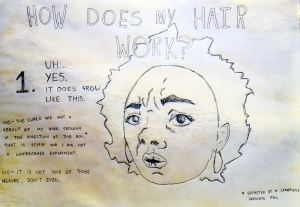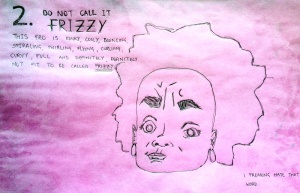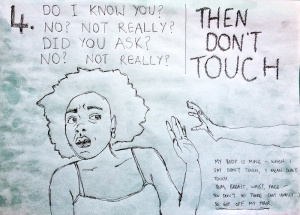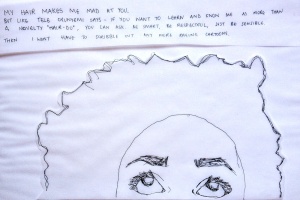Exactly one week ago Tele Ogunyemi told us why afro-Caribbean hair is a political matter and why ‘Can I Touch Your Hair?’ is a question worth deconstructing. With the aid of a series of wonderful illustrations, Mariel Richards returns to the topic in part II of No Fly on the WALL‘s discussion and tells us why she, unlike Tele, is far less inclined to accommodate the ‘wandering hand’, even just once.
For many women, hair is simply a part of them that can be worn up or down, adorned with clips and jewellery and cut and styled. For me, my hair is often a site of frustration and anger as well as one of pride and love. These cartoons are a catharsis, a recognition of the ignorance that informs many attitudes towards black hair, as well as a rage and rant and huge exasperated sigh. I’d love to view every grab, question and stare as an attempt to understand and relate to me, my hair, and my race, but for those moments when I can’t, here are some angry cartoons.
My hair has always played a huge part in the way I have viewed myself and those around me. My best friends are the women I grew up with, and we still mark points in our friendship by stories about our hair. My relationship with my mother, and the deep love and respect I hold for her has been strengthened by my sudden realisation that she (a white woman, originally from Hebburn near Newcastle) must have initially struggled with caring for her daughter’s afro hair. All praise to her, I never spent a day looking untidy, and she learned to plait and twist better than the hairdressers. My little sister and I, after following the exact same pattern of learning to love our hair in its natural state (not without some ugly, ugly mistakes), regularly bond over mixing new haircare recipes and twisting each other’s plaits at night.
Coming to University at Cambridge then, from an environment in which my hair was never something I was ashamed of, noted for or really that aware of as different, was a bit of a shock. Suddenly, I was the girl with the afro – ‘Yeah Mariel, the girl with the hair – the big hair?’ I spent much of freshers week dodging grasping hands in clubs and bars, and nervously fielding questions on how it grew, how I slept on it, could they touch it, have a photo with “it”, and the inevitable ugly references to hair I may or may not have elsewhere.
It wasn’t just amongst other students that my hair caused me worry – trying to buy products to use in the first few weeks of term was a nightmare. At home, I live around the corner from a haircare store that provides everything I need. Here, I was in a new city and totally lost. Long before I knew of the wonders of Mill Road, I desperately tried in Superdrug where I was met with ‘we don’t have stuff for… that.’ and Boots, where I was directed to look ‘in a shop with more black customers’. Needless to say, the managers of both stores got an earful.
It is through moving from my little circle of afro love in London to a city that was, at first (and sometimes still) unwelcoming to its ethnic minority population that forced me to come to grips with how my hair marks me and those around. These cartoons were scratched and scribbled out after I read Tele Ogunyemi’s ‘Can I Touch Your Hair?’ article. Tele’s words let me see how I could best cope with the often unbearable ‘other-ising’ and exoticising that black women often face, but they couldn’t fully sooth the anger that reactions to my hair have caused me.



